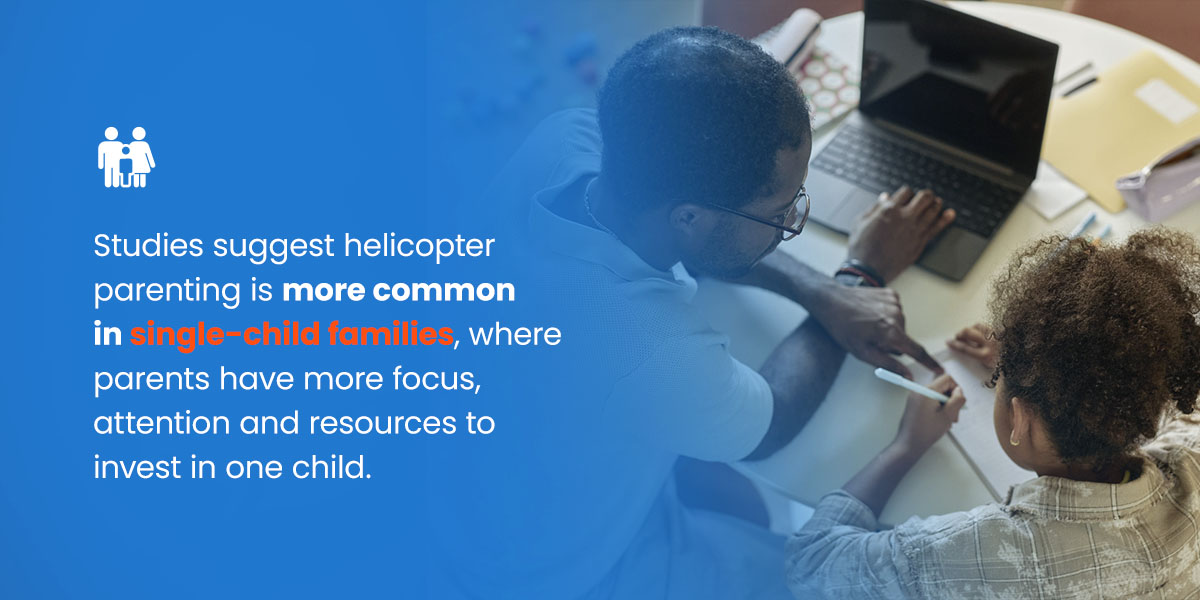Table of Contents
The Effects of Helicopter Parenting on Child and Teen Mental Health
Although protecting and supporting your child is naturally a top priority, overly involved approaches like the helicopter parenting style can inadvertently impact a child’s mental health and development. Fortunately, by learning the style’s effects, causes and alternatives, you can make more informed choices and encourage healthier, more independent growth in your child.
What Is Helicopter Parenting?
Although helicopter parenting looks different across cultures, families and individuals, it usually involves a parent who is highly involved in their child’s social, academic and extracurricular life. They often make decisions on their child’s behalf and intervene when their child faces challenges, such as:
- Choosing their friends and opportunities.
- Prescribing how they approach tasks.
- Managing their activities and schedules.
- Curating their experiences.
Why Helicopter Parenting Develops
Parents can adopt the helicopter parenting style for several reasons, including:
- Fear of harm and failure: Parents may adopt this style out of genuine concern for their child’s safety, using control and intervention to shield them from potential harm or setbacks.
- Societal pressures: Society’s high expectations and competitive environments can make parents feel responsible for their children’s achievements, leading them to intervene more actively.
- Cultural norms: Parents may consider helicopter parenting necessary and appropriate in cultures that emphasize collective family success and academic achievement.
- Single-child families: Studies suggest helicopter parenting is more common in single-child families, where parents have more focus, attention and resources to invest in one child.

- Perfectionism: Driven by high personal standards, perfectionistic parents may excessively involve themselves in their child’s life, seeing their achievements as a reflection of their own worth.
How Does Helicopter Parenting Impact Children?
Helicopter parenting can pose long-term challenges for children, both psychologically and behaviorally.
Psychological Effects of Overprotection
Overprotective parenting, while often well-intentioned, can have significant psychological consequences for children. By consistently sheltering children from challenges, parents may inadvertently compromise their children’s mental health, self-reliance and essential coping skills. Overprotection can also cause:
- Chronic stress: Children may feel intense pressure and worry about meeting parental expectations.
- Depression and anxiety: Research suggests that helicopter parenting increases mental illness rates in young people.
- Restricted independence: Overprotected children may struggle to develop independent thinking and complete tasks alone.
- Lack of responsibility: Without experiencing adversity, overprotected children may not understand consequences or how to face them.
Impact on Self-Esteem and Confidence
Without enough opportunities to do things on their own, children can feel insecure about their own capabilities and reluctant to solve problems by themselves. They may fear failure, avoid taking risks and trying new things, and struggle with low self-worth as they compare themselves to their more independent peers. Inversely, some children develop an inflated sense of self-importance and entitlement from excessive attention and assistance.
Emotional and Social Development Challenges
Over-sheltering and limited social interaction can make it difficult for children to form peer relationships and navigate social situations. As a result, they may struggle to manage conflicts and advocate for themselves. By shielding them from real-life learning experiences, helicopter parenting can also stunt emotional resilience development, leaving children less able to regulate their emotions.
What Are Helicopter Parenting’s Effects on Parent-Child Relationships?
While helicopter parents often act out of love, their overinvolvement can have long-term consequences that ultimately change the family dynamics.
Parent-Child Trust
Helicopter parenting can affect trust in both directions. Parents’ overmanaging may make children doubt whether their parents think they’re capable. This can make them feel like they can’t handle things independently, and they may also question whether their parents truly respect their judgment. Over time, they may stop sharing their problems and distance themselves.
Blurred Boundaries
The helicopter parenting style usually lacks appropriate boundaries between parent and child. While some research suggests it might encourage affection in certain cultures, this overinvolvement can also cause conflict, create unhealthy dependence, diminish both parties’ sense of personal identity, and lead the child to feel responsible for the parent’s emotional well-being.
Long-Term Impacts on Family Dynamics
In families with helicopter parents, siblings might feel less important because they get less attention, or they might even start helicopter parenting their sibling, either because they think that’s how to show love or because they want their parents’ approval. Plus, if the parents have different parenting styles, it can undermine the non-helicopter parent’s authority and create confusing power struggles.
How Do You Encourage Independence and Healthy Development?
Approach your child’s development holistically by supporting their social, emotional and cognitive growth.
Set Healthy Boundaries
Clear boundaries encourage independence by providing a safe framework for children to explore and learn within. Share control by guiding your children while letting them make age-appropriate decisions within a supportive environment. Begin with small, manageable boundaries and gradually expand them as the child matures. This approach helps children develop self-reliance and decision-making skills:
- Early childhood: Support their growing sense of self by respecting their choices about things like showing physical affection, sharing toys, clothing preferences and hairstyles — within reason.
- Middle childhood: Offer guidance but give them space to find their own solutions, letting them experience safe, natural consequences and supporting their choice of extracurriculars.
- Adolescence: Prepare them for adulthood by respecting their safe friendships, allowing them to manage their own schedules, maintaining confidentiality and honoring their personal space.
Promote Self-Esteem in Children
Encourage your child to make age-appropriate decisions on their own. Praise them for effort rather than successful outcomes to help your child develop a growth mindset and a willingness to embrace challenges as opportunities for learning. Most importantly, offer unconditional love and acceptance, encouraging perseverance and creativity so they learn they’re worth much more than achievements.
Build Resilience and Emotional Strength
Help your child build resilience and emotional strength by allowing them to face some tame adversity. Through it, they can learn from failure and develop healthy coping and problem-solving skills. Actively help them identify their strengths and interests, letting them build confidence and passion for activities they love. Be a role model for healthy emotional expression. Explain that it’s OK to feel big emotions and that you’ll support them unconditionally.
How Can You Manage Helicopter Parenting and Its Consequences?
Finding the right balance between supporting your child and fostering their independence can be tough, but effective strategies and resources are available to help you create a healthier dynamic.
Steps to Transition Toward a Balanced Parenting Style
Aim for authoritative, not authoritarian, parenting by combining warmth with clear expectations. This style balances support and structure, encouraging self-esteem, academic performance, social skills and well-adjusted behavior. Embrace self-care and “good-enough” parenting, which promotes self-compassion and acceptance in yourself and your child to avoid anxiety and burnout.
How Professional Counseling Can Help
Therapy and specialized life skills coaching can help your child and family navigate helicopter parenting’s complex consequences:
- Cognitive behavioral therapy (CBT): CBT helps your child identify and challenge negative thoughts and develop strategies to improve their mood and resilience.
- Executive function coaching: Your child will learn essential skills like planning, organization and task management, boosting their independence and capabilities.
- Family therapy: Family therapy can help improve communication and strengthen relationships by providing a structured setting to address conflicts.
- Dialectical behavioral therapy (DBT): DBT introduces mindfulness, emotional regulation and communication to your child, helping them navigate new or difficult situations.
- Play therapy: Children can express themselves and overcome challenges through play therapy, providing a safe environment to develop healthy coping mechanisms.
Nurture Your Child’s Independence and Well-Being With Courageous Kids Counseling
If you recognize the signs of helicopter parenting in your approach and want to help your child thrive more confidently, Courageous Kids Counseling can help. Through CBT, family counseling, life skills coaching services and other evidence-based solutions, your child can develop essential problem-solving skills, manage their difficult emotions and build stronger relationships.
To get started, schedule an appointment or contact us today.



